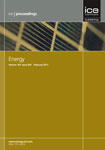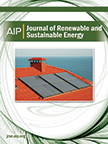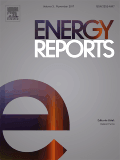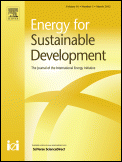
International Journal of Renewable Energy Research
Scope & Guideline
Shaping the future of energy through rigorous research.
Introduction
Aims and Scopes
- Renewable Energy Systems Design and Evaluation:
The journal covers the design, optimization, and performance assessment of various renewable energy systems including solar, wind, geothermal, and biomass. This encompasses both theoretical modeling and practical implementations. - Energy Management and Storage Solutions:
Research on energy management strategies for integrating renewable energy sources with energy storage systems is a key focus. This includes studies on battery management systems, hybrid systems, and optimization algorithms for energy dispatch. - Innovative Control Strategies:
The journal highlights advancements in control methodologies for renewable energy systems, including fuzzy logic, artificial intelligence, and machine learning techniques aimed at enhancing the efficiency and reliability of energy systems. - Sustainability and Environmental Impact Assessments:
Papers often address the sustainability aspects of renewable energy technologies, including life cycle assessments, environmental impacts, and socio-economic factors related to the deployment of renewable systems. - Technological Innovations in Energy Conversion:
The journal emphasizes new technologies and innovations in energy conversion devices, such as photovoltaic cells, wind turbines, and bioenergy systems, focusing on improvements in efficiency and cost-effectiveness.
Trending and Emerging
- Artificial Intelligence and Machine Learning in Energy Systems:
There is a marked increase in research employing AI and machine learning techniques for optimizing renewable energy systems, enhancing predictive maintenance, and improving energy efficiency. - Hybrid Renewable Energy Systems:
The integration of multiple renewable energy sources into hybrid systems is gaining traction, with studies exploring the synergies between solar, wind, and energy storage technologies to enhance reliability and efficiency. - Energy Storage Technologies:
Research focused on innovative energy storage solutions, such as advanced batteries and supercapacitors, is on the rise. These technologies are crucial for addressing the intermittency issues associated with renewable energy sources. - Smart Grid Technologies:
The development and implementation of smart grid technologies, which facilitate the integration of renewable energy into existing power infrastructures, are increasingly featured in recent publications. - Sustainability Assessments and Life Cycle Analyses:
A growing emphasis on sustainability assessments, including life cycle analyses of renewable energy technologies, reflects the increasing importance of environmental impacts and sustainability in energy research.
Declining or Waning
- Traditional Biomass Energy Research:
While biomass remains an important renewable energy source, the focus on traditional biomass energy research has decreased as attention shifts towards more advanced and cleaner technologies such as solar and wind energy. - Single Technology Studies without Integration:
Research that focuses solely on individual renewable technologies without considering integrated or hybrid systems is becoming less frequent, as the trend moves towards multi-source energy solutions that enhance reliability and efficiency. - Basic Theoretical Models:
There has been a noticeable decline in the publication of papers centered around basic theoretical models of renewable energy systems. This trend indicates a shift towards more applied research that emphasizes practical applications and technology development. - Generalized Energy Policy Discussions:
Discussions centered on broad energy policies without specific focus on renewable technologies or practical implications are less prevalent, as the journal increasingly prioritizes research with concrete technological advancements.
Similar Journals

Smart Energy
Empowering Energy Innovation through Open Access ResearchSmart Energy, an esteemed publication by ELSEVIER, stands at the forefront of energy research, exploring innovative solutions and sustainability practices in the energy sector. With an impressive Open Access model since its inception in 2021, this journal has rapidly established itself as a vital resource for researchers and professionals alike, providing unrestricted access to high-quality peer-reviewed articles. Positioned in the Q1 category across multiple fields, including Energy Engineering and Power Technology, Renewable Energy, and Management, Monitoring, Policy and Law, Smart Energy demonstrates a strong commitment to advancing knowledge in the energy domain. Registered under the ISSN 2666-9552, it garners significant attention, ranking within the top ranges of Scopus metrics across various disciplines. The journal continuously aims to bridge the gap between academic research and practical application, making it an essential outlet for scholars and practitioners dedicated to fostering sustainable energy solutions worldwide. Located in the United Kingdom, Smart Energy is shaping the future of energy management from its publishing base in Amsterdam, the Netherlands.

Batteries-Basel
Driving Progress in Electrochemical InnovationsBatteries-Basel, published by MDPI, is a premier open-access journal since 2015 that aims to serve the growing community focused on the technological advancements and innovations in battery science and related fields. Operating from its base in Switzerland, this journal publishes high-quality research covering the fields of Electrical and Electronic Engineering, Electrochemistry, and Energy Engineering and Power Technology. With a commendable Q2 ranking in multiple categories for 2023, it consistently strives to present cutting-edge studies, reviews, and practical applications that drive progress in energy storage technologies. Researchers and professionals will find invaluable insights within its pages, contributing to both theoretical understanding and practical deployment of battery technologies. Open access provides broad dissemination of knowledge, ensuring that discoveries reach a global audience, and fostering collaborative efforts to address the challenges posed by modern energy demands.

Journal of the Japan Institute of Energy
Advancing Sustainable Energy Solutions.Journal of the Japan Institute of Energy, ISSN 0916-8753, is a reputable academic journal dedicated to the field of energy studies, reflecting the dynamic and evolving landscape of energy research. Published by the Japan Institute of Energy, the journal serves as a platform for disseminating innovative research, technologies, and methodologies related to energy engineering, renewable energy sources, and sustainability practices. While this journal does not currently offer open access, it remains a vital resource for professionals, researchers, and students alike, particularly those focused on advancing knowledge within Energy Engineering and Power Technology, Fuel Technology, and related areas. As of 2023, it is ranked in the Q4 quartile across several categories in Scopus, which highlights its foundational role in fostering scholarly discourse, despite its lower ranking in the competitive global landscape. Established in 1990 and continuously evolving, the journal provides insights into the challenges and innovations in the energy sector, making it an essential read for anyone invested in the future of energy solutions.

Proceedings of the Institution of Civil Engineers-Energy
Shaping the future of power technology through research.Proceedings of the Institution of Civil Engineers-Energy is a pivotal journal published by Emerald Group Publishing Ltd, focusing on the dynamic fields of energy engineering and power technology. With an ISSN of 1751-4223 and an E-ISSN of 1751-4231, this journal stands at the forefront of advancing research from 2008 to 2024, encapsulating critical insights into energy systems, sustainability, and innovative practices within the energy sector. The journal holds a commendable position in Scopus rankings, especially in the categories of Energy Engineering and Power Technology, with a Q3 quartile ranking reflecting its growing influence and relevance. Though currently not Open Access, it provides valuable content for researchers and professionals seeking to explore emerging trends and challenges in energy management and renewable resources. Aimed at bridging the gap between theoretical frameworks and practical applications, this journal is essential for anyone invested in the transformation of the energy landscape.

Journal of Renewable and Sustainable Energy
Transforming Research into Renewable RealityThe Journal of Renewable and Sustainable Energy, published by AIP Publishing, stands at the forefront of research in the fields of renewable energy and sustainable practices. With an ISSN of 1941-7012, this journal aims to foster innovative research and exchange of knowledge on sustainable technologies and methodologies that contribute to environmental conservation and energy efficiency. Achieving a prestigious Q2 ranking in the category of Renewable Energy, Sustainability, and the Environment, it ranks 135 out of 270 journals in Scopus, signifying its impactful contributions to the field. The journal, active from 2010 to 2024, provides a platform for authors, analysts, and practitioners to disseminate significant findings that can shape future environmental policies and energy frameworks. Although not currently an Open Access publication, it remains an essential resource for researchers dedicated to advancing sustainable development and energy solutions.

Energy Reports
Connecting Researchers to Transform Energy PracticesEnergy Reports, published by Elsevier, is a prestigious open access journal that serves as a vital resource in the field of energy research. Since its inception in 2015, this journal has swiftly ascended to become a key player in disseminating knowledge across various energy-related disciplines, evident from its impressive Q2 ranking in the miscellaneous category of Energy for 2023 and its notable position in the 78th percentile among over 70 journals in the general energy category, ranked 16th out of 73 on Scopus. Based in the United Kingdom, Energy Reports not only fosters innovative research but also promotes accessibility by providing open access to its articles, thereby ensuring that findings reach a global audience of researchers, professionals, and students. With a commitment to advancing sustainable energy solutions and technologies, Energy Reports plays a crucial role in shaping future energy policies and practices, making it an essential platform for scholarly communication in the ever-evolving landscape of energy research.

ELECTRICAL ENGINEERING
Driving Progress in Electrical and Electronic SolutionsELECTRICAL ENGINEERING is a distinguished journal published by Springer that addresses the multifaceted challenges and advancements in the field of electrical and electronic engineering. With an impact factor that reflects its significance in the academic community, this journal offers vital insights into emerging technologies and groundbreaking research findings. Operating without open access, it provides a platform for rigorous peer-reviewed articles that span from applied mathematics to engineering disciplines. The journal has established a strong reputation, ranking in the Q2 category for Electrical and Electronic Engineering and Q3 for Applied Mathematics as of 2023, which showcases its commitment to high-quality research. The journal is indexed in Scopus, placing it within the 53rd to 71st percentiles in its respective categories. Researchers, professionals, and students alike will find ELECTRICAL ENGINEERING an invaluable resource for staying abreast of innovations and developments that shape the future of the electrical engineering landscape.

AIMS Energy
Fueling Knowledge, Powering SolutionsAIMS Energy is a leading academic journal published by the American Institute of Mathematical Sciences (AIMS), dedicated to advancing the field of energy research. With a strong commitment to Open Access since its inception in 2013, this journal offers a platform for researchers, professionals, and students to share innovative findings and enrich the discourse in crucial areas such as Energy Engineering and Power Technology, Fuel Technology, and Renewable Energy, Sustainability and the Environment. Recognized for its quality, AIMS Energy holds a respectable impact with a Q3 ranking in multiple categories as of 2023, and it ranks within the top half of its peers in the Scopus database. The journal's objective is to disseminate high-quality research that addresses contemporary challenges in energy and offers sustainable solutions. By fostering collaboration and discussion among various stakeholders, AIMS Energy plays a critical role in shaping the future of energy technologies and policies.

Energy for Sustainable Development
Connecting disciplines to tackle energy challenges head-on.Energy for Sustainable Development, published by Elsevier, is a leading interdisciplinary journal dedicated to advancing the academic discourse at the intersection of energy, sustainability, and development. With an impressive Q1 ranking in the fields of Geography, Planning and Development, and Management, Monitoring, Policy and Law, the journal stands out in the academic community for its rigorous peer-reviewed content that addresses crucial energy challenges and promotes innovative solutions. Since its inception, the journal has transitioned through various converged periods, reflecting on dynamic research trends from 1994 onwards. Notably, it boasts meaningful Scopus rankings, including a position in the top 10% of journals for Geography and Planning. Although it currently does not provide open access, the rich pool of research articles published here serves as a vital resource for researchers, professionals, and students committed to fostering sustainable development practices globally. As energy issues become increasingly pivotal in policy formulation and environmental considerations, Energy for Sustainable Development remains a crucial platform for disseminating impactful knowledge and fostering collaboration across disciplines.

Advances in Energy Research
Connecting Ideas and Innovations in Energy Sustainability.Advances in Energy Research is a prominent journal dedicated to the exploration and advancement of energy technologies and sustainable practices. Published by TECHNO-PRESS, this journal serves as a vital platform for researchers, professionals, and students in the energy field, featuring innovative studies and reviews that contribute to the body of knowledge surrounding energy efficiency, renewable resources, and the integration of new technologies. The journal holds a significant position in energy research and aims to facilitate the dissemination of groundbreaking findings and ideas that are pivotal for the transition toward a more sustainable energy future. Located in South Korea, with an ISSN of 2287-6316, it embraces an open access philosophy that ensures widespread availability of its content, further enhancing its impact in the academic community.